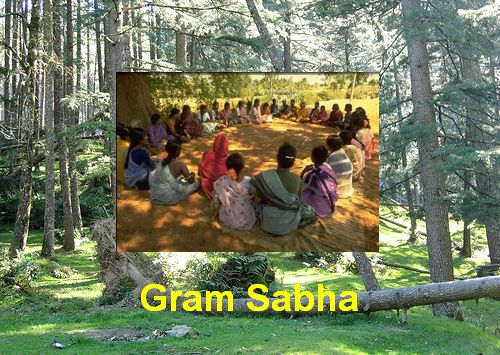The Panchayats (Extension
to the Scheduled Areas) Act, 1996 (PESA,1996)
**The
Panchayats (Extension to the Scheduled Areas) Act, 1996 (PESA, 1996) was
enacted and came into operation on 24 December,
1996.
**This Act extends Panchayats to the
tribal areas of nine States, namely, Andhra Pradesh, Chhattisgarh,Gujarat,
Himachal Pradesh, Jharkhand,Maharashtra, Madhya Pradesh, Orissa and Rajasthan,
which intends to enable tribal society to assume control over their own
destiny to preserve and conserve their traditional rights over natural
resources.

**All the State Governments have
enacted their State Legislations in pursuance with the PESA, 1996.
**However, the State Governments are
required to amend all the relevant Acts/Rules to bring them in conformity with
the provisions of the PESA, 1996.
-----------------------------------------------------------------------------------------
Going into the background of
it
Village level democracy became a real
prospect for India in 1992 with the 73rd
amendment to the Constitution, which mandated that resources,
responsibility and decision making be passed on from central government to the
lowest unit of the governance, the Gram Sabha or the Village Assembly. A three
tier structure of local self government was envisaged under this amendment.
Since the laws do not
automatically cover the scheduled areas, the PESA Act was in-acted in 1996 to
enable Tribal Self Rule in these areas. The Act extended the
provisions of Panchayats to the tribal areas of nine states that have Fifth
Schedule Areas.
The PESA Act gives radical
governance powers to the tribal community and recognizes its traditional
community rights over local natural resources. It not only accepts the validity
of “customary law, social and religious practices, and traditional management
practices of community resources”, but also directs the state governments not
to make any law which is inconsistent with these. Accepting a clear-cut role
for the community, it gives wide-ranging powers to Gram Sabhas, which had
hitherto been denied to them by the lawmakers of the country.

Gram Sabha are
endowed specifically with the following powers-
(i) the power to
enforce prohibition or to regulate or restrict the sale and consumption of any
intoxicant;
(ii) the
ownership of minor forest produce;
(iii) the power
to prevent alienation of land in the Scheduled Areas and to take appropriate
action to restore any unlawfully alienated land of a Scheduled Tribes;
(iv) the power to
manage village markets by whatever name called;
(v) the power to
exercise control over money lending to the Scheduled Tribes;
(vi) the power to
exercise control over institutions and functionaries in all social sectors;
(vii) the power
to control over local plans and resources for such plans including tribal
sub-plans;
-------------------------------------------------------------------------------------------
How will PESA help to counter
face Naxalism ?

The full-fledged implementation of PESA
will give Rs 50,000 crore to tribal communities to develop themselves. Nothing
would deal a bigger blow to the Maoists than participative development by, for
and of the tribal communities. Of the 76 districts highly infected by the
Maoists, 32 are PESA districts. Hence, honest implementation of the PESA Act
would empower the marginalized tribals so that they can take care of their
developmental needs. This would deprive the Naxals of their ground support
coming from the misguided and helpless tribals.
